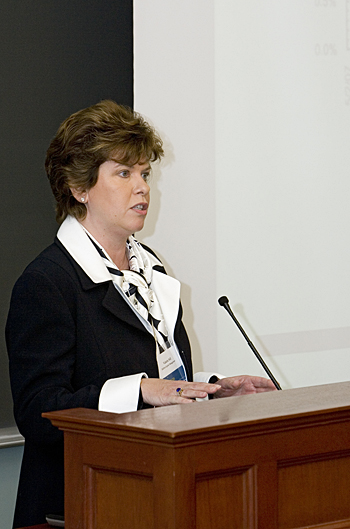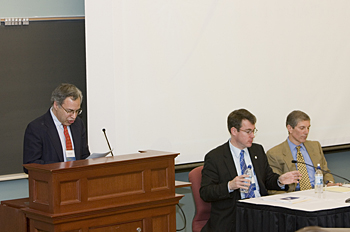6:30 p.m., May 11, 2008--Young people today will have Social Security benefits when they reach retirement age but those benefits will be 78 percent of what they are today unless something is done to shore up the system, said Laurence Seidman, UD Chaplin Tyler Professor of Economics at UD, speaking at an afternoon UD Forum panel session titled “An Uncertain Future: Public and Private Asset Management and Retirement Planning.”
Seidman told a capacity crowd that when he asks his students if they believe that Social Security benefits won't be there when they retire, more than half raise their hands.
This is a misconception, he said. “We have a serious problem in Social Security, but we don't have a crisis; we don't have a collapse on the horizon.” The system needs fixing, and there are various ways to do it, but it will not go broke, he said.
Seidman, who is an expert on Social Security, acted as moderator for and a speaker on the panel, which included a spokesperson for the Social Security Administration, an investment adviser and corporate pension manager.
Seidman's comments came after James Courtney, deputy commissioner for communications in the Social Security Administration, gave an overview of the system and its financial status.
“Social Security is more than just a retirement plan," Courtney said, noting that about one in six Americans receives Social Security benefits. Roughly 70 percent of those receive retirement benefits, 15 percent receive disability benefits and 15 percent are survivors of a worker who died, Courtney said. And while young people aren't concerned about Social Security, according to statistics, one in four of today's 20-year-olds will become disabled before retirement age, he said.
Courtney said of the 114 million retirees receiving Social Security benefits, only one in five has saved anything else for retirement and Social Security only covers 40 percent of pre-retirement earnings.
He said the system is funded by a 6.2 percent tax on income up to $102,000 paid by both worker and employer.
Valerie J. Sill, president and CEO of DuPont Capital Management, institutional pension managers, started with the outlook for the economy, the credit crunch and their implications as to where to put retirement investments.
“A year ago nobody would have realized how far-reaching the subprime crisis would become," she said. "It is so far-reaching that it created a vicious liquidity cycle that threatens global economic growth and created issues for the Federal Reserve to resolve.”

Sill predicted the economy will remain weak with rising inflation and a huge increase in defaults and bankruptcies. Housing prices will not rebound until mid 2009, she said, and lower revenue growth will slow spending by businesses and consumers.
In light of all that, Sill said returns on stocks, corporate bonds, treasury notes and residential real estate will be lower over the next few years.
But Daniel Strickberger, co-managing partner of DSM Capital Partners, investment advisers, said there is a bright spot on the investment horizon. Inflation is low in the major developed nations, he said, and their economies are pretty good, mainly because of lower marginal tax rates and increased free trade.
“When the Iron Curtain came down it brought billions of people into the world ready, willing and able to work," Strickberger said. That, plus free trade and lower tax rates in these countries, has caused a boom in the global economy and that shouldn't change. “Buy index funds globally as big as you can as fast as you can,” he said.
Strickberger urged investors to find a good mutual fund company and invest in global index funds. He also advised people to spend less, save more and to buy no-risk U.S. Treasury bonds if they are looking for safe investments.
Article by Barbara Garrison
Photos by Kathy Atkinson



